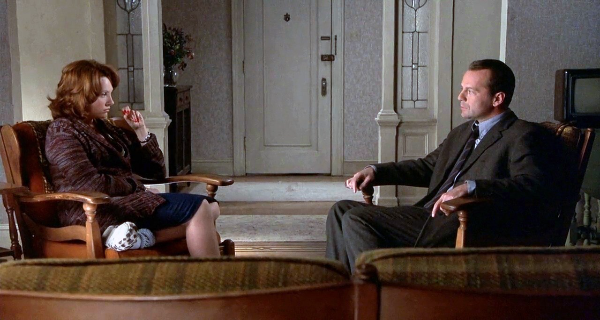M. Night Shyamalan’s breakthrough blockbuster The Sixth Sense achieved critical acclaim, and multiple Academy Award nominations and it gave audiences one of the most memorable plot twists of all time. Grossing nearly $700 million worldwide, The Sixth Sense has a legacy stretching across the years. This chilling tale about the young Cole Sears (Haley Joel Osment) who can see ghosts is a psychological drama first and a horror movie second, yet it’s the twist ending that made The Sixth Sense a sleeper hit and a genuine pop culture touchstone. As Shyamalan releases his latest thriller Knock at the Cabin, starring Dave Bautista and Jonathan Groff, it feels like a great time to revisit Shyamalan’s classic smash hit that stunned audiences all those years ago.
Behind the Viel
Indeed, The Sixth Sense was a rare gem that took audiences by surprise. The film opened in 1999 with low expectations but ended up bringing countless back to the cinema who were desperate to unravel the mystery. Within just two weeks of its release, The Sixth Sense made back its $40 million production, and it became one of the stand-out movies of the 1990s. It was the third film Shyamalan directed, which immediately overshadowed his previous work. And thanks to word-of-mouth, the film’s twist ending has become more or less public knowledge, so watching back The Sixth Sense today knowing the truth opens the film up to several different readings. The Sixth Sense is full of clues and motifs that hint toward the movie’s secret and they’re easy to spot on a re-watch. For example, there’s a constant appearance of the colour red throughout when ghosts are nearby; the air gets frosty in the presence of the dead, and the fact that Malcolm doesn’t converse with anyone besides Cole for the entire movie. The scenes between Malcolm and his wife (Olivia Williams) appear like a breakdown in the marriage, and we assume Cole’s mother (Toni Collette) has hired Malcolm to treat her son with child therapy sessions. Shyamalan toys with the viewer’s perception like a magic trick, planting the seed of deceit in the very first act.

Shyamalan dances around with information, only giving us vague details about the ghosts and the specific rules of this world. (“They don’t see each other… They don’t know they’re dead,”) Cole explains to Malcolm in a pivotal moment between the pair. Throughout the film, Shyamalan shows an audacious commitment to a brooding tone and feelings of uncertainty that make the audience question what they’re watching. It’s a style that Shyamalan has carried over into many of his later films, like Unbreakable and Signs. Shyamalan does it all without any cheap thrills or gore, and many hair-raising moments build towards the film’s conclusion. However, it’s easy to forget that The Sixth Sense has always been so much more than its “shock” ending.
At its core, The Sixth Sense is a poignant human-interest piece in the guise of a horror movie. It’s a film about redemption, loss, and emotional trauma – in which Cole must learn to overcome his fears. The horror element is always present, but Shyamalan seems more concerned with overriding themes, like grief, isolation, and the importance of communicating with others. Cole’s journey gives the film a more sustained, melancholic atmosphere in which the real threat comes from within. Cole quite literally has a sixth sense that isolates him from other people, and the film offers a sympathetic examination of a boy’s torment at the hands of the things he can’t understand or process. In any case, The Sixth Sense has a thematic resonance that makes it much more than a one-trick puzzle movie, and it’s one of the few genre movies to create horror through the eyes of a child.
A Long-Lasting Impression
Of course, Osment was a genuine revelation as Cole. It’s a performance that won him an Award Nomination for Best Supporting Actor, (although he was clearly in a co-led role). To this day, it’s still one of the greatest performances I’ve seen from a child actor. Osment carries the heart of the film, handling the horror of his situation with sheer, dramatic force. Throughout, Osment is never anything less than believable, especially in the more sentimental moments, like when Cole finally reveals his secret to his mother, who had been struggling to understand her son’s withdrawn behaviour. While the relationship between Cole and his mother is a great bit of domestic drama, the scenes with Osment and Willis together are the backbone of the film. As Cole comes to terms with his gift and learns it’s his purpose to help the spirits with their “unfinished business”, Shyamalan’s message of reconciliation becomes clear – which humanizes the horror, creating a complex, layered movie.

The Sixth Sense is a masterclass in storytelling and suspense; it’s an exemplary work from M. Knight Shyamalan and the best film of his career. While Shymalan remains a divisive filmmaker, he always finds a way to leave audiences wanting more. With a knack for playing on deeper meanings and subtext, there’s real joy in unpacking Shyamalan‘s movies. Over twenty years later and The Sixth Sense holds up perfectly. It should be remembered as a classic horror-drama and an enduring film with a powerful story that takes the viewer to some dark places – but makes sure to shine a light at the end.



